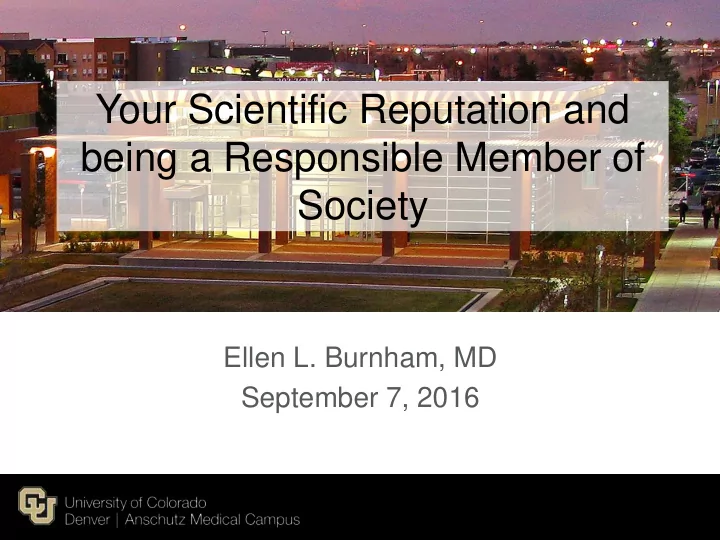

Your Scientific Reputation and being a Responsible Member of Society Ellen L. Burnham, MD September 7, 2016
Objectives: • Explain why a good scientific reputation is important in academia • Describe the factors that contribute to a good scientific reputation • Identify the components to being a responsible member of the scientific community • Describe threats that may harm one’s scientific reputation, and responses to challenges that you can implement
The 10 Most Prestigious Jobs in America, Harris Poll’s List, September 2014 LESS MORE Has a great deal of PRESTIGE Has not that Not at all PRESTIGE Has prestige prestige (NET) much prestige prestigious (NET) Doctor % 88 45 44 12 8 4 Military officer % 78 34 44 22 16 6 Firefighter % 76 32 44 24 17 6 Scientist % 76 30 46 24 19 5 Nurse % 70 24 46 30 23 7 Engineer % 69 18 52 31 24 7 Police officer % 66 21 44 34 25 10 Priest/Minister/ 62 21 41 38 26 12 Clergy % Architect % 62 13 49 38 29 9 Athlete % 60 23 38 40 25 15 Teacher % 60 21 40 40 30 10 Lawyer % 60 16 44 40 26 15
Pew Research Center Surveys • Science has long been esteemed among citizens and professionals • Americans recognize accomplishments of scientists in key fields • Despite dispute about role of government in certain realms, – Broad public support for government investment in scientific research www.pewinternet.org/2015/01/29
Therefore, maintaining (or restoring) a polished scientific reputation may be more important than ever before…but just what is a Scientific Reputation ? • Quantitative as well as Qualitative Factors • Foundation is elusive • Not immediate: acquired over your career. – Analogous to compound interest • Very easy to lose, and once gone, nearly impossible to recover • Do achievements stand apart from personality?
How can one’s environment impact his/her Scientific Reputation? For good or for bad… • How may a person’s reputation be related to the institution he/she works? • How may an individual’s reputation be related to the reputation of his/her research group? • Be cognizant of this impact on your personal scientific reputation and manage it wisely!
What are some tangible ways that your scientific reputation may affect: • Promotion? • Funding portfolio? • Attract co-workers and post docs? • Gain media attention? • Gain peer approval? • Receive awards?
How would you judge scientific reputation? • Objective measures? • Subjective measures?
The four “pillars” of scientific reputation 1. Published papers along with their impact factor and citations received (objective) 2. Research grants received (objective) 3. Patents filed and commercialized (objective) 4. Excellent interpersonal and communications skills, along with ability to travel widely (appeal to broad audience) (subjective)
Surely an element of chance, luck and politics in the establishment of reputations… Ground-breaking discoveries of Nobel prize laureates and other famous scientists are not only acknowledged by many citations of their landmark papers. It was also demonstrated that publication of these papers boosted citation rates of their previous publications , even if in unrelated areas. “Boosting effect” for the authors’ reputations! Mazloumian A et al PLoS One 2011
Is it just chance / luck or politics? • Does citation rate truly reflect meritorious research or does it reflect the current reputation of the author? • How do you find the meritorious research? There’s so much to read! • Scientific community acts as a collective search engine to cull out most important material • Is this efficient, or are gems being overlooked? • As a result, sometimes the rich do get richer (undeservedly) See article: “Are scientific reputations boosted artificially?” Philip Ball, Nature published online, May 6, 2011, doi 10.1038/news2011.270
Reputation and impact in academic careers • Developed mathematical framework to measure how a publication’s citation rate depends on the reputation of its central author , in addition to its net citation count • Author reputation measured by number of times his/her publications were referenced, also the number of appearances of his/her name in the literature. Did not account for publication quality. • Findings: – Early in a paper’s life cycle = author reputation drives citation count – After a certain “tipping point” = author reputation less of a driver in citation count Petersen AM et al PNAS 2014
Potential impact? • Young scientists lacking (any) reputation can be negatively affected by social stratification – Potential impetus to work with mentors or groups with a “good” reputation, but potentially a bad fit • Young scientists and others want to improve online visibility, to “game” reputation systems – Employ self-citation strategies to boost reputation – Search engines (Google scholar) provide results according to citation measures, fostering this behavior Petersen AM PNAS 2014
How to build and maintain a scientific reputation [“Ten simple rules for building and maintain a scientific reputation”, P. Bourne, V. Barbour, PLOS computational biology, June 2011, Vol. 7 Issue 6 e1002108] • Think before you act – email etiquette • Do not ignore criticism of others – Extremes of response suspicious • Do not ignore people – “golden rule”…be a listener • Diligently check everything you publish and take publishing seriously – Authorship must be earned
• Always declare conflicts of interest – Would you like to see it on front page of paper? • Do your share for the community – Bring something to the table • Do not commit to tasks you cannot complete – Become a sponsor
• Do not write poor reviews of grants and papers – Honesty with tact • Do not write references for people who do not deserve it – Will always end poorly • Never plagiarize or doctor data – Backup data and recheck statistics
Recommend
More recommend